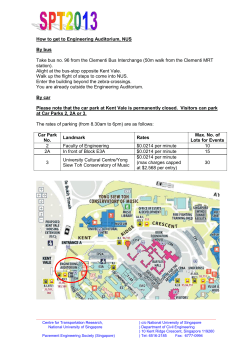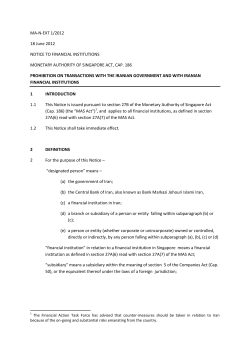
How to prepare for tHe impact of fair
feature article - roundtable co-hosteD with zurich global life singapore How to prepare for the impact of FAIR Everyone in the insurance industry in Singapore is grappling with how to plan for implementation of the Financial Advisory Industry Review (FAIR). At a recent roundtable Hubbis co-hosted with Zurich, leading practitioners from the manufacturing and distribution sides of the business analysed the practical impacts of the new regime. Uncertainties around the implications of FAIR continue to leave many individuals within Singapore’s insurance and advisory community challenged when it comes to preparing their businesses accordingly for the future. Industry leaders continue to grapple with various questions relating to, for example: what advice will look and feel like under the new regime; how the competitive landscape is likely to develop; which products they should prioritise; what infrastructure will be needed to cope with new requirements and customer demands; and the best way to structure their adviser training and monitoring. Yet without doubt, this is the first step towards a more transparent, customer-centric way of delivering advice. This was according to senior practitioners from insurance companies, IFAs, private banks and other market practitioners – sharing views at a lunchtime discussion co-hosted by Hubbis and Zurich Global Life Singapore. It also followed the release in December 2013 by Hubbis and Zurich of a Best Practice Report. Christopher Gill Friends Provident International Limited “While the extent of the reforms is a fair way from what many industry practitioners expected, more is no doubt to come” 1 editor@hubbis.com | www.hubbis.com The start of changes to come In the context of assessing the impact of FAIR, it is notable that this is just the first step along a journey that the Monetary Authority of Singapore (MAS) seems to be taking along the road of fee-based advice. “While the extent of the reforms is a fair way from what many industry practitioners expected, more is no doubt to come,” explains Chris Gill, general manager, South-east Asia, for Friends Provident International Limited (Singapore Branch). For example, adds Craig Ellis, head of region and chief executive officer in Singapore at Royal Skandia, the regulator has already highlighted that the product offering will be next on the reform agenda. The MAS has observed what has happened in 2013 in the UK with the Retail Distribution Review (RDR) and also in Australia with similar style reforms. “The initial outcome appears to be a set of pragmatic regulations to move towards that direction,” adds Gill. Back to web version feature article - roundtable co-hosteD with zurich global life singapore Peter Huber Zurich Global Life Singapore “We don’t think enough about how to get the relevant information and verify it in a more customer-friendly way” Becoming more client centric A key stated objective of FAIR has always been customer-focused advice. Yet being more customer centric should be about delivering better financial advice across the range of an individual’s needs. For example, someone’s mortgage typically forms a key part of their financial situation and overall planning. “Insurance providers have effectively banned emotions from the insurance-buying process,” says Peter Huber, chief executive officer of Zurich Global Life Singapore. Within the high net worth space, the focus in terms of insurance is on Universal Life. But, says Bernard Sechaud, wealth planning specialist at UBS Wealth Management, there is also a desire to look for alternative solutions to help clients address retirement planning needs. through an intense process but might ask them to come back for further tests, and then decline them. We need to bring emotions into the process.” “We also refer our clients to various third-party brokers,” he adds. “FAIR has provided a good opportunity for us to review the way our brokers will now interact with our clients.” Certainly a better and more consistent engagement with customers can breed trust and loyalty. Sechaud explains that the feedback ranges from brokers willing to stick to the exact MAS recommendation on one “FAIR has provided a good opportunity for us to review the way our brokers will now interact with our clients.” “This can be seen from the nature of the documentation that customers have to sign.” Insurance companies are also not as focused as they could be on the customer experience. “We don’t think enough about how to get the relevant information and verify it in a more customer-friendly way,” adds Huber. “For example, in medical examinations, we send customers 2 According to Gill at Friends Provident International Limited (Singapore Branch), one of the implications of greater transparency, along with social media and consumer pressure, is an expectation of more consumer advocacy going forward. editor@hubbis.com | www.hubbis.com Bernard Sechaud UBS Wealth Management “There is also a desire to look for alternative solutions to help clients address retirement planning needs” Back to web version feature article - roundtable co-hosteD with zurich global life singapore Byron J Murphy Globaleye “Too much seems open to interpretation in the new regime” end of the spectrum, to some others feeling comfortable with continuing to follow their current approach as long as they work only with Accredited Investors (AIs), on the other end. More broadly, it seems that an opportunity has been missed in Singapore. ing requirements created under FAIR, and limits the potential for improving competency. “Many so called professionals tend to pay lip service to the regulations in terms of doing what is asked of them from a compliance perspective,” says “For advisers who deal with AIs, they don’t need to do anything differently,.” In the UK and Australia, for example, the focus is on holistic financial advice across all types of product. By contrast, the approach in Singapore under FAIR has made it about a specific sub-set of the financial services offering. The result is a focus on certain insurance and wealth management products, despite the breadth of the MAS’ remit in this area. Enhancing adviser quality Byron J Murphy, vice president, private wealth management, at Globaleye. “Invariably what needs to be demonstrable is skill, experience and knowledge.” He says that he and his colleagues find the general lack of enforcement of standards often creates an uneven playing field. “Too much seems open to interpretation in the new regime.” According to Murphy, the removal of any minimum industry qualifications for advisers dealing with AIs makes it difficult to justify running a compliant business considering the cost of maintaining the training, due diligence and fit-and-proper requirements, particularly when compared with an advisory business that only deals with AIs. “FAIR is supposed to be about raising the bar in terms of improving standards and ensuring higher levels of qualifications, ethics and capability. Yet for advisers who exclusively deal with AIs, they are in effect exempt from the required standards,” he explains. The UK continues to provide a benchmark for how Singapore’s advisory model might develop going forward. “The regulators (ie. UK) are now thinking about introducing behaviouralbased advice,” explains Huber. Craig Ellis Royal Skandia “The regulator has already highlighted that the product offering will be next on the reform agenda” The narrow focus on a sub-set of financial services extends to the train- 3 editor@hubbis.com | www.hubbis.com Back to web version feature article - roundtable co-hosteD with zurich global life singapore “So even in cases where clients tick all the right boxes, if the adviser has a feeling that a client is not really suitable for a product or is not revealing all information, then the adviser has to turn that client down. Matthew Dabbs AAM Advisory A return to agency distribution might then be necessary given the higher levels of training, he adds. “There are just over 100 individual expat advisers in Singapore, so the market is significantly under-broked” A more focused expat market On the expat side of the IFA business, the current small number of advisers is possibly going to get smaller as a result of the various issues relating to regulation, licensing, qualifications and immigration policy. “There are question-marks about whether there is still enough money to be made in the industry given the 55% first-year commission cap,” says Ian Pryor, managing partner, expat advisory group, at IPP Financial Advisers. “This is especially pertinent for expat firms given the need to pay higher salaries for the fewer individual advisers that are of sufficient quality.” “One of the widely-agreed outcomes from FAIR is the inevitable development of more technology-based, user-friendly platforms, especially including online business transactions.” A key concern for some firms is that if the universe of expat advisers shrinks, what will this mean for the quality of advice generally? For Matthew Dabbs, chief executive officer for AAM Advisory, meanwhile, Ian Pryor IPP Financial Advisers “There are question-marks about whether there is still enough money to be made in the industry given the 55% first-year commission cap” 4 editor@hubbis.com | www.hubbis.com FAIR presents a huge opportunity in the expat IFA advisory market. “There are just over 100 individual expat advisers in Singapore, so the market is significantly under-broked.” Adds Dabbs: “FAIR is doing a good job of consolidating the market. But while we are seeing and will continue to see the number of companies shrinking; the remaining companies will be larger and continue to grow.” A greater role for technology-driven offerings One of the widely-agreed outcomes from FAIR is the inevitable development of more technology-based, userfriendly platforms, especially including online business transactions. This is required to service consumers who are much more technology-savvy Back to web version feature article - roundtable co-hosteD with zurich global life singapore Warwick Young Aviva “The fact that consumers cannot purchase most insurance products online does not help with the evolution of technology” and want to be able to view their investments quickly and easily, as well as to interact. The power of technology can be seen via Friendsurance, which is a business started in Germany and is now expanding to Australia. “This is essentially dis-intermediating the insurance industry by enabling a crowd-sourced group where friends come together to buy insurance as a network and receive claims settlements as one group,” explains Huber. This is less likely to result in any wrongful claims, he predicts, as people know that they would be cheating their friends. Plus, they get lower premiums. However, insurance tends to be a relatively conservative industry, and companies have a lot of legacy issues. So to change the status quo will take some time. “The fact that consumers cannot purchase most insurance products online does not help with the evolution of technology,” says Warwick Young, Aviva’s chief financial officer. Plus, there are still some challenges relating to automation. 5 “There are certain regulations that require paper documents that confirm a particular customer purchase or order. It has been difficult so far to get these requirements removed,” says Young. Further, while several providers have platforms which now accept e-signatures, Murphy at Globaleye says it can be a struggle in many cases to get providers to match the firm’s processes and level of electronic compliance. “One of our biggest challenges, however, isn’t related to applications but rather the switching of funds,” he adds. “Getting physical wet signatures for hundreds if not thousands of clients is a huge burden.” In today’s should be the client count – is environment, Murphy says it the case that an email from – from their own email acsufficient confirmation. “There should be more understanding between the various parties about what the regulations are trying to protect,” he says. “They should really be trying to ensure the client understands the product they have agreed to purchase. How editor@hubbis.com | www.hubbis.com they then provide the authorisation and its ongoing servicing shouldn’t then always require such an archaic process as a wet signature.” To what extent has the consumer also moved on in terms of the way they want to receive advice and interact using technology? asks Huber. According to Gill, meanwhile, despite the critical role that technology will inevitably play going forward, this will be more as an enabler. “It is still a people business,” he says. “For our larger-ticket transactions, clients want someone to deal with face-to-face.” Participants Senior individuals from the following organisations participated in this lunchtime discussion: AAM Advisory Royal Skandia PIAS Meyado Private Wealth Management IPP Financial Advisers Globaleye Friends Provident International Towers Watson Aviva UBS Wealth Management International Financial Services Phillip Securities The Henley Group Zurich Global Life Singapore Back to web version
© Copyright 2025




















